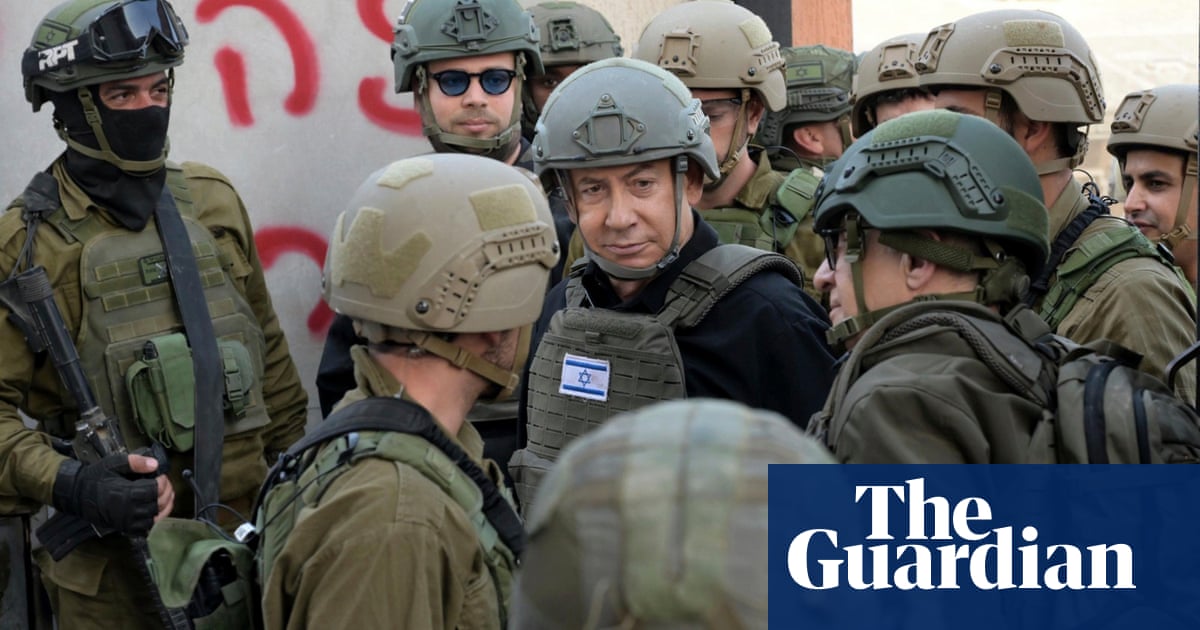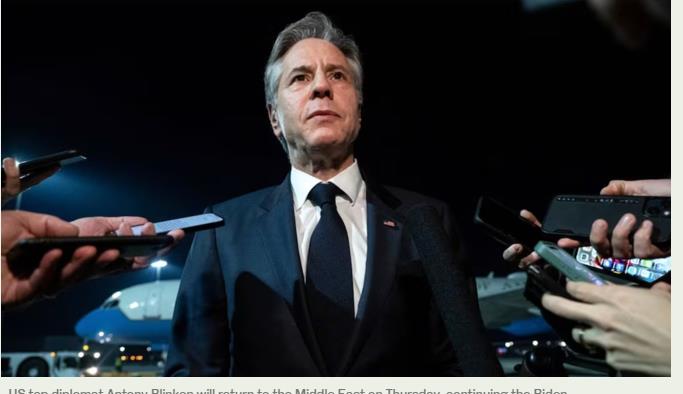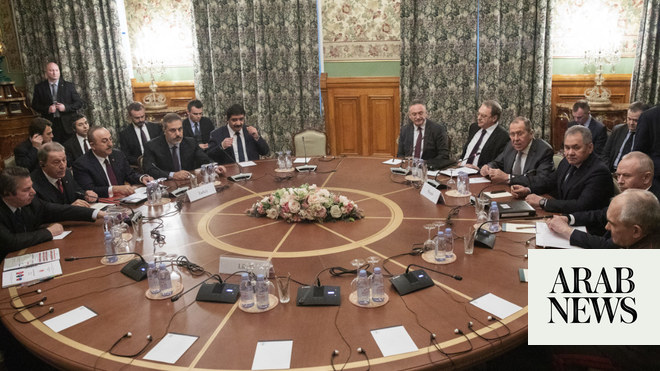
US Secretary of State Antony Blinken departed Monday for Israel and other unspecified countries in the Middle East as the United States seeks to move forward on efforts to resolve the conflict in the wake of the killing of Hamas leader Yahya Sinwar.
American officials, led by President Joe Biden, remain staunchly hopeful diplomacy can eventually prevail — there is little alternative, they say — and have sought in their conversations with allies in the region to create momentum behind a new ceasefire push resulting in the release of hostages, even one with smaller ambitions than the three-phase proposal once on the table.
Yet days after Sinwar was killed by Israeli troops in southern Gaza, the fundamentals of the deadlocked talks remain unchanged.
There appears to be little clarity on who will take over the militant group, making it difficult to ascertain the probability of striking a new deal. Hamas has shown no inclination to change its stance on hostage and ceasefire negotiations.
“Their internal dynamics will take some time,” a regional diplomatic official told CNN. What does appear clear, the official said, is that Hamas isn’t budging on the ceasefire and hostage talks and will only consider going back to the three-phase deal that was under discussion for many months before Sinwar’s death.
US officials expect to learn more about who might be taking the reins for Sinwar over the course of the next week after Blinken’s engagements in the region.
Israel, meanwhile, has continued a relentless military campaign in northern Gaza in the days following Sinwar’s killing, and has shown no signs of letting up on its northern front in Lebanon. The specter of Israel’s response to Iran for Tehran’s missile attack earlier this month still looms, bringing with it the potential for regional conflagration.
Last week, Biden told Israeli Prime Minister Benjamin Netanyahu in a telephone call it was time to “move on” from the Gaza war. But there is little evidence over the past year of Netanyahu taking Biden’s advice, and the Israeli premier has vowed since Sinwar’s death that the war is “not over.”
Israeli will “continue forward until the end,” Netanyahu said Saturday in brief remarks to Israeli media. Asked if anything would deter him, Netanyahu replied: “No, nothing will deter us. We continue until victory.”
The comments appeared to fly in the face of the Biden administration, which immediately started pushing the notion of a turning point in the fighting after Sinwar’s killing.
“We think that there’s a possibility of working to a ceasefire in Lebanon. And it’s going to be harder in Gaza, but we agree that there has to be an outcome: what happens the day after,” Biden told reporters at the end of last week.
Even as Biden and his entire national security team publicly voiced optimism at bringing the Gaza war to an end following Sinwar’s death, US diplomats and regional allies are privately skeptical. Some question whether the lesson Israel took from Sinwar’s death is that American calls for de-escalation over the last several months were premature.
They are unsure exactly how the Biden administration plans to rally support for a post-war plan that has been in the works for the better part of the last year, particularly when the US elections are two weeks away and amid questions about who will pick up the baton for Sinwar.
Blinken, while in Israel, will discuss the day after plans for Gaza. While a senior State Department official said those talks have entered a new phase in recent weeks with specific details being discussed, there remains a major impediment: Arab countries are not in agreement on what governance of Gaza should look like after the conflict, the official said, according to pool reports.
Some officials said they could foresee a new plan floated that calls instead for a temporary pause in fighting to allow the release of hostages, stopping short of an immediate ceasefire. Such a plan would also call for renewed talks toward a more permanent cessation of hostilities.
The White House was clear-eyed Monday about the status of a diplomatic outcome in Gaza or Lebanon, conceding that negotiations toward a ceasefire are not “about to restart.”
“I cannot sit here today and tell you that that negotiations are about to restart in Doha or Cairo or anywhere else for that matter,” National Security Council spokesman John Kirby said.
Questions remain about the impact of Sinwar’s death, both in efforts to bring home the hostages held by Hamas and ending the wider regional tensions.
Negotiations had all but collapsed mere weeks ago, and US officials have downplayed the prospect of their quick resumption — in part because it’s unclear who would act as Hamas’s ultimate decision maker when and if negotiations resume.
The regional diplomatic source called it a “safe bet” that Sinwar’s brother Mohammed could take the lead for the hostages inside Gaza. Mohammed Sinwar’s name “keeps popping up,” though the official cautioned it’s still not confirmed. Yahya Sinwar’s brother was a close confidante and “has a network and the relationships inside Gaza to talk about the hostage issue.”
Mohammed Sinwar is seen as being as hardline as his brother and a key developer of Gaza’s formidable tunnel network, where hostages are believed to have been held. In September a senior Israeli official told CNN that Mohammad Sinwar had taken over as Hamas’ military commander after the killing of its pre-war chief Mohammed Deif in an Israeli air strike in July.
Mohammed Sinwar’s ascent could mean “negotiations are totally screwed,” one US official warned CNN last week after Yahya Sinwar was killed.
To lead the overall organization, top Hamas negotiator Khalil al-Hayya, who is based in Doha, is getting backing from pro-Iran, pro-Gaza corners, the regional official said. But other external elements of Hamas could push for someone else.
Yahya Sinwar was named overall leader after the previous chief negotiator, Ismail Haniyeh, was killed in an assassination in Tehran, believed to have been carried out by Israel. That meant that Israel was killing and hunting the very Hamas figures involved in the halting ceasefire talks.
Meanwhile, Hamas is being pressured by Qatar and Egypt to re-engage on ceasefire negotiations, but the mediators have been told “point blank” that Hamas is not considering any changes to the three-phase plan that was announced by the Biden administration in late May and then approved by the UN Security Council.
Blinken is expected to meet with top Israeli officials, including Netanyahu, on Tuesday, amid tempered expectations he will return to Washington having made any significant progress on the hostage talks.
Instead, when he touches down in Tel Aviv, US officials believe that the most pivotal place for him to make progress is on the grave humanitarian situation in Gaza, according to a senior US official. Last week, the Biden administration sent a letter to the Israeli government demanding it act to improve the humanitarian situation in Gaza within the next 30 days or risk violating US laws governing foreign military assistance, suggesting US military aid could be in jeopardy.
Historically, the Israelis have shown a higher likelihood of making progress on humanitarian issues after pressure from Biden and after in-person discussions, the official said, and they are hoping that is the case during this week’s trip.
Despite the long odds, some US officials remain hopeful that driving an end to the Gaza conflict is possible, particularly given Netanyahu’s desire for a deal to normalize relations with Saudi Arabia, the official said. US officials are adamant that Saudi Crown Prince Mohammed bin Salman would not agree to such a deal without an end to the war and a path toward a Palestinian state.
But in a sign of shifting global allegiances, many leaders from the region will be in Russia during Blinken’s visit this week, attending a summit hosted by President Vladimir Putin of the BRICS nations — a sign that few are banking solely on the United States in a unsteady world. — CNN












